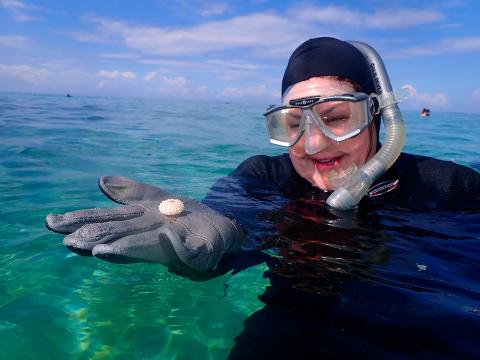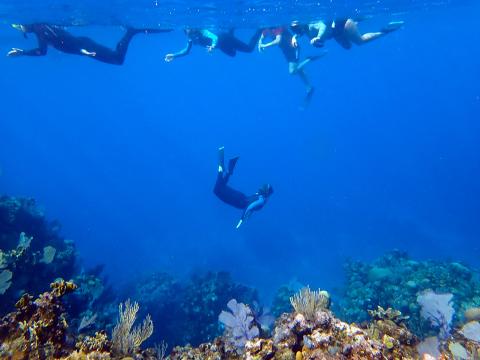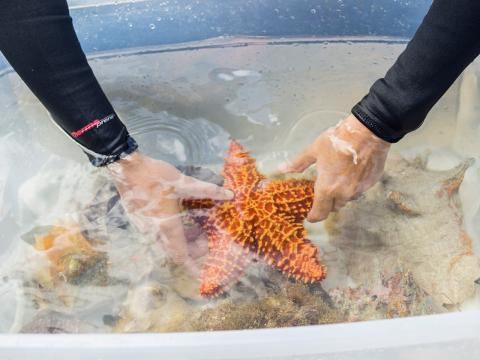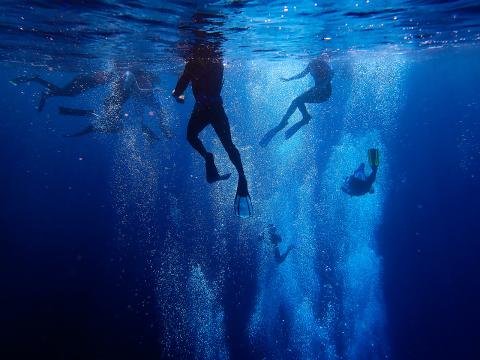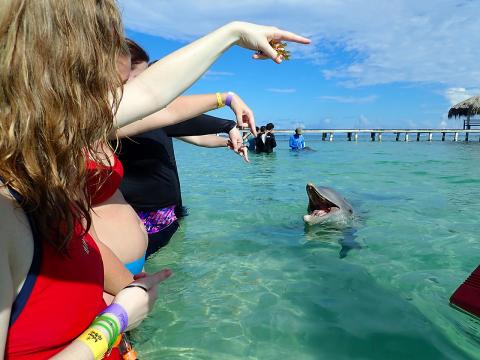Out of the Classroom, and Into the Ocean
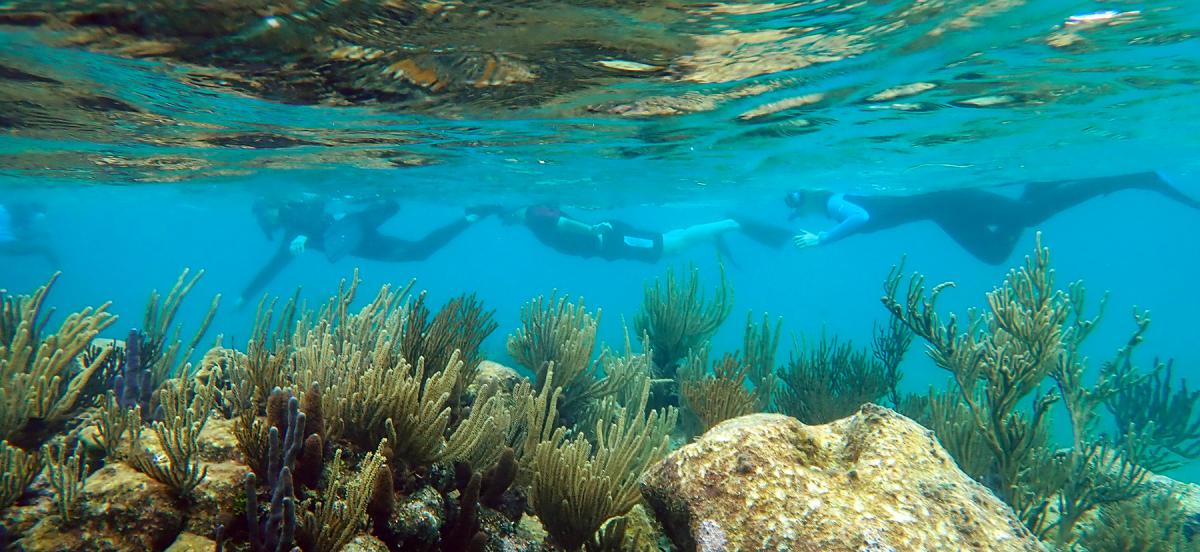
The Haverford crew went snorkeling at least twice a day while they were in Roatán, Honduras. Photo by Patrick Montero.
Details
Students from Kristen Whalen’s “Advanced Topics in Biology of Marine Life” class spent a week over winter break exploring tropical coral ecosystems in Roatán, Honduras.
When people say that Haverford students are immersed in their studies they usually mean it figuratively. But for five of the students in Kristen Whalen’s “Advanced Topics in Biology of Marine Life” course who traveled to Roatán, Honduras, early in January for a field study exploring tropical coral ecosystems, the immersion was literal.
At least two times a day, the students—along with Whalen, Post-Doctoral Investigator Jamie Becker, and former Visiting Assistant Professor of Biology Matt Carrigan—hopped on a private boat to snorkel in the clear, turquoise waters of the Caribbean Bay, only occasionally donning wet suits due to the warm waters, to explore coral diversity and identify fish, turtles, invertebrates, and algae on the second largest coral reef on Earth known as the Mesoamerican Barrier Reef.
“It was the first time I had snorkeled at a barrier reef and I learned a lot about the inhabitants—we saw octopi, squids, sea turtles, eagle rays, scorpion fish, nudibranch, flamingo tongues, and more,” said biology major and environmental studies minor Laura Donahue ’19. “One of the days we went snorkeling at a fantastic part of the reef … and we ended up swimming through a Trichodesmium bloom. Trichodesmium is an important diazotrophic cyanobacteria that I studied all summer, so that was a really exciting moment for me.”
Whalen, an assistant professor of biology, organized the trip with support from the Center for Peace and Global Citizenship, the Koshland Integrated Natural Sciences Center, and Provost Office as a way to bring the previous semester’s classroom work to life for her students. “Advanced Topics in Biology of Marine Life” is an interdisciplinary seven-week course that explores human impacts on the oceans and challenges students to form scientific understandings of those problems plaguing the ocean and communicate feasible solutions. During the course students dive into the primary literature and interpret data in order to generate a rational approach to solving global problems.

Caribbean coral reefs are arguably the most impacted by human influence, from reef decline due to rising ocean temperatures and acidification, pollution from agricultural run-off or ocean plastics, or threats from invasive species from distant oceans. After first teaching the course in fall 2017, Whalen decided that students needed first-hand experience with these ecosystems and the problems that plague them, hoping to attract both students interested in the field of marine biology, conservation, policy, and those who had never seen the ocean before.
“I remember the first time I snorkeled on a coral reef. I was 12 years old and it was so powerful, I decided to become a marine scientist,” said Whalen. “I want Haverford students to have the same opportunities I had to become inspired and emboldened to make a change in the world.”
Thus the trip to Honduras was born. For seven days over winter break, the Haverford cohort stayed at Anthony’s Key Resort, which was established over 50 years ago within a marine protected area adjacent to the nonprofit Roatán Institute of Marine Science and is dedicated to conservation and education. Before their daily dives, the students met in an on-site classroom for lectures about the flora and fauna they would encounter underwater that day.
“At the Roatán Institute for Marine Science, students and scientists have been tracking the health of the reefs for decades now and working with the local community to help put in place measures to allow the reefs to thrive and humans to sustainably make a living from the ocean,” said Whalen, noting that its conservation efforts, including protection from overfishing and banning plastics, make it one of the last places to see the sorts of coral reefs that were once prevalent all over the Caribbean more than 30 years ago. “Anthony's Key Resort is dedicated to educating students and the public about marine health, and offers classrooms, wet labs, and dive boats to study marine organisms both in the classroom and on the reef.”
“We spent every day learning something new about the reef in lecture or in the water,” said Donahue. “It was amazing because we would listen to a lecture about coral identification and then get to snorkel and practice the identification a few hours later. ... Almost every topic that we covered during the class—from marine microplastics to over-fishing to invasive species—was present in Roatán.”
There was also plenty of time for fun, too. The Bi-Co crew—which also included Elly Overton ’19, Scott Pollara ’19, Juliana Benitez ’20, and Shelby Hoogland BMC ’19—swam with dolphins who are a part of the resort’s Dolphin Conservation Program, visited the nearby Ethnic Honduran Art Exhibit Center, went paddle boarding, and took a guided tour of the Animal Sanctuary and Rescue Center to see such native Honduran wildlife as jaguars and monkeys. They enjoyed meals of local sustainable seafood and ate breakfasts of traditional balaedas—a thick tortilla filled with mashed fried red beans and cheese.
“We snorkeled in tongue and groove reefs and over huge drop offs, as well as in 15 feet of water in the back reef where sea grass environments are punctuated with giant coral heads,” said Whalen. “We also did a night snorkel, which was a first for all the students. We saw octopi, lobsters, pufferfish, squirrelfish, and much more—all of which are hidden during the day.”
It was, in fact, a trip of firsts: it marked the first time Whalen had taken her students on a field study trip, the first time Scott Pollara had ever snorkeled, and the first time Juliana Benitez ever swam in the ocean. It was a shared adventure, but it was also educationally rich and inspiring.
That was the point, says Whalen, she wanted her students to not only learn about a unique marine environment, but to inspire them to help protect and conserve it.
“This is the first time in 20 years that I have not lived next to the ocean, so field experiences like this re-inspire my passion and rejuvenate my soul,” said Whalen. “Engaged learning experiences make the knowledge in the classroom more accessible to students and create lasting educational and emotional impacts on their lives. Haverford is about opening students’ minds to new experiences and ways of thinking, and trips of this nature provide new perspectives by immersive learning that cannot be achieved any other way.”
